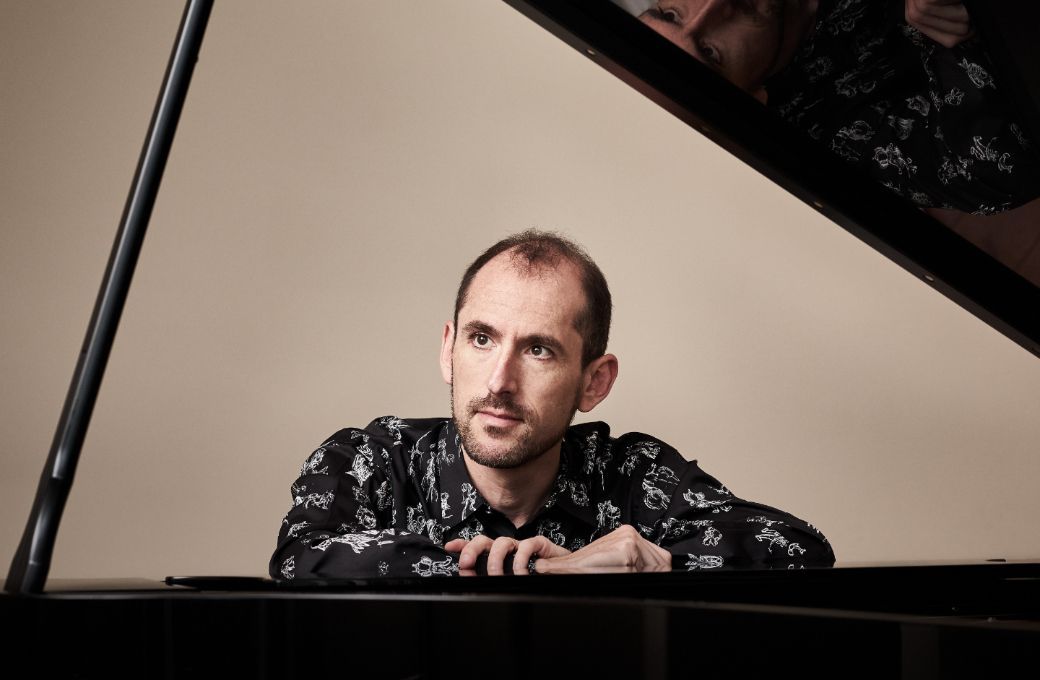On 13th March, Danny Driver will be looking out of his hotel room in New York and hoping to see blue skies ahead. Last year he was geared up to give his debut recital in the city when the heavens opened over Brooklyn. “I barely made it to the hall in time for a short rehearsal, completely soaked. About 30 people out of 300 managed to get there. The rain washed away most of the audience, and quite a lot of my sanity!”

Driver’s catalogue of recordings bears witness to the breadth of his repertoire, from Handel to Ligeti. Both composers find their place on a concert programme in the Key Pianists series at Carnegie Hall, alongside works by Beethoven, Schumann, Fauré and Gabriela Lena Frank. Drawing lines across time between these composers comes to him readily and spontaneously. “I think it was Glenn Gould who said that when you’re rooted in a system, you can dip your toe outside it, and that’s when really interesting things start to happen.”
“As a performer,” Driver says, “I am looking for a dialogue with an audience. I’m interested in drawing the energy of the room to the stage and not just throwing stuff out there. Once you find common ground, there’s no limit to how much you can invent, and how far you can bring people with you. That’s why I believe in programmes like this one – broad ranging and quite challenging. It probably asks a lot of listeners. There is new music, very serious music – but the pieces themselves search out common ground.”
In his day, Handel reached more disparate audiences than any of his contemporaries, including Bach. Driver approaches the fifth of Handel’s “Eight Great Suites”, as they were published in 1720, from a typically oblique angle. “I often wonder about Mozart and his piano music, and how often we refer to it a manifestation of opera within the context of a solo performer. I think that applies to Handel, too. He was an opera composer, a master improviser, a master contrapuntalist, but also led by the voice and by lyricism. He gets out of the counterpoint when he feels like it.”
We circle back more than once to the figure of Carl Philipp Emmanuel Bach, eldest son of Johann Sebastian, who mirrors Driver’s restlessly inquisitive spirit, a composer “inside the system” with the independence of mind and technique to operate outside it. The brilliance of works such as the Württemburg Sonatas, which Driver recorded for Hyperion, “became neglected because he’s not so neat and organised. He’s not so ‘marketable’. It’s true to life in a stream-of-consciousness fashion, almost like James Joyce. And it’s so far ahead of its time, where other composers seem to be looking back.”
As Driver points out, piano teaching tends to privilege the rigour of JS Bach. “Handel touches the same skill library, if you like, with a lighter brush.” In his last years, gathering energy, technique and material for works such as the Missa solemnis and Diabelli Variations, Beethoven buried himself in scores of Bach, and Handel above all. “He achieved maximal effect with minimal means – that was what Beethoven said about Handel. And when you look at the late Beethoven piano sonatas, with all those fugues, they are much more Handelian than Bachian.”
Driver’s Carnegie programme closes with the last of those sonatas, Op.111, which opens with the dots and trills of a Baroque-era French overture. “The genius and the chutzpah of the whole thing is how Beethoven stops and breaks free, does something else, and yet maintains this fugal texture and the drama of multiple voices. But it’s not a solution to a canonic problem. It’s driven by drama, and by the human spirit. In that way, I think, late Beethoven is more similar to Handel.”
Beethoven’s deafness, among other factors, makes it tempting to view the composer as an isolated genius. “And of course, that’s not true,” says Driver. “Think of Ligeti, closer to our own time, where this strikingly original musical language is precisely so striking because it’s so firmly rooted, with multiple branches, in just about any other kind of music that you might care to name.” A quality common to Handel, Beethoven and Ligeti, and how we understand them through the music they wrote, is a high-spirited wit not always identical to good humour.
“A friend of Beethoven’s said that when he smiled, the whole room would light up. People change, and Beethoven had a hard time in many ways, but the essence of his humour is still there in the late music. Tragedy and humour live side by side” – as they do in the Études by Ligeti. Driver will play three of them, including Fanfares from Book 1: “My favourite, I think.” Why is that? “The humour is one reason. In one sense he makes it out of very classical material. Any vertical slice of the piece is basically a major or minor chord. But they go by so rapidly that you don't sense that at all. It becomes bewildering: I like that. And it has this great rhythmic engine underneath: 208 bars of unchanging ostinato.”
What Beethoven and Ligeti also share is the drive to extend the technical resources of both pianos and pianists beyond previously conceivable limits. Ligeti’s models were the études of Chopin, Scriabin, Lyapunov and Rachmaninov – “you can see references to them in the sketchbooks. But the challenge is not necessarily in how you move your fingers. It’s in how you hear music. There’s a lot of verticality in the piano tradition and the way we learn piano music. Chopin was a great contrapuntalist – I get laughed at when I say that, but he wrote with that sensibility. It’s only once you start to hear the multiplicity of voices in Ligeti that playing it really becomes possible. You’re no longer just dealing with complex patterns and uncomfortable positions. You know which voice is moving once you can hear them all at the same time. And then you access something transcendental in the music.”
The music of Chopin and Schumann, composed in the generation after Beethoven was pounding away on his Hammerklavier, still seems to define the sound of the piano, and perhaps for good reason. “There is something about pianos when they get steel frames, when the sounds become bigger, when cross-stringing comes in, and textures become more homogeneous. This technological drive surely makes its way into how a composer thinks and feels.” The influence of Chopin may be felt in the Nocturno Nazqueño by Gabriela Lena Frank but, Driver says, “her Latin American heritage comes across very strongly in the music. I just find it to be a very beautiful, very haunting work.”
The central work in the Key Pianists recital is the Études symphoniques which the 24-year-old Schumann composed in 1834 (just 12 years after Op.111). The Études as a whole never achieved a fixed form either in print or in Schumann’s mind, and Driver has been evolving his own approach in “a 20-year dialogue” with them. He points out that the “symphonic” part of the title should be taken seriously. “It is a strict set of variations, almost all in the same key. A lot of them are exactly the same length. But already in the second variation you feel that the music is orchestrating itself on the page, even while being completely written for the piano. The Études and Kreisleriana are the works of his which I enjoy performing the most, but the Études particularly connect with other projects on my mind.”
Driver has variations on the brain: he has lately recorded the Goldberg Variations for Onyx, and will play them at Wigmore Hall to launch a five-concert series dedicated to landmark sets of piano variations, including Beethoven, Medtner and more. At the same time, his conversation turns the entire history of music into a universal set of theme and variations. “It’s not a historical project,” Driver says of CPE Bach: both his playing and his thinking bring all this music off the page as a living and evolving entity – provided the floods don’t wash it away.
Danny Driver performs in the Key Pianists series at Carnegie Hall on 13th March.
This article was sponsored by Hemsing Associates.


